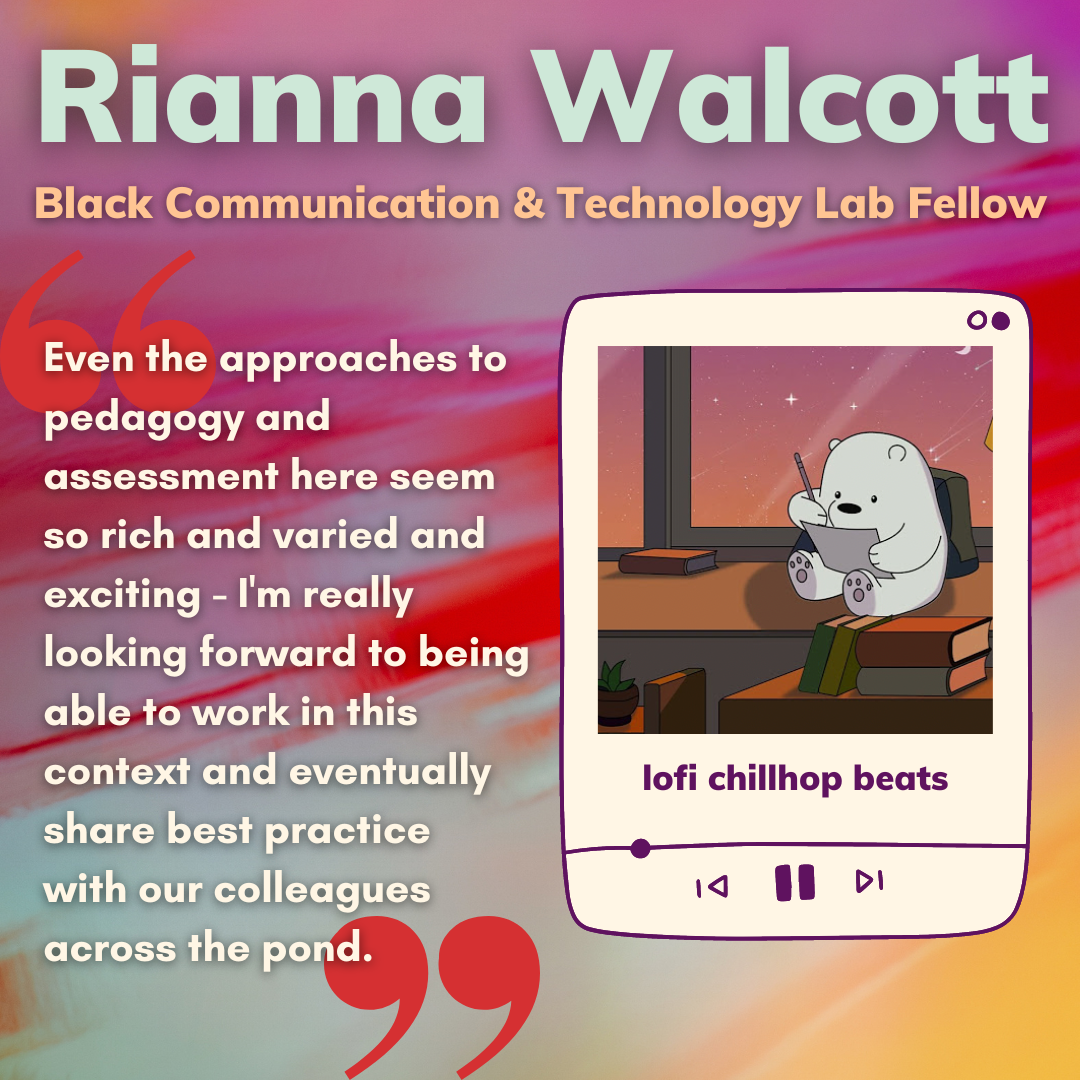Meet our DISCO Network Fellows: Rianna Walcott
Q: Can you tell us about your research?
A: My PhD research focuses on Black British identity presentation in social media spaces. By taking a mixed-methods approach to investigating Black British social media usage, I incorporate interviews and discourse analysis across various sites in order to examine digitalcommunities, the circumstances under which they are created, and the constraints they face. This research investigates if and how discourse varies in different contexts with different demographics, and how social network services — and their attendant harms — impact how Black users express themselves.
Q: What drew you to this work?
This work, and indeed most of my work, starts with my lived experience. I find that my own experiences of academia, technology and digital communication are often the impetus for the type of research I’m interested in. In this case of my PhD research, I was drawn to the digital humanities as a field when, while living, working, and studying at a predominantly white institution in Scotland. When Beyonce’s Lemonade dropped, I realised that the conversations I was having with like-minded people online were not reflected in my offline world: the digital worlds that the white people around me were inhabiting were distinct and separate from mine. This was my first real taste of the fact that black people inhabit totally different technological spaces, spaces that functioned as enclaves, by, for, and about Black communication. Similarly, my work on mental health access for Black, Asian and minority ethnic (BAME) people in the UK has been based on my own experience of navigating healthcare systems that are not designed with people like me in mind. Finally, my work on decolonising academic institutions is yet another project that was born out of my own experience of marginalisation within predominantly white academic institutions.
Q: What will you be doing this year through the DISCO Network?
A: This year I will be hosted by the Black Communication and Technology Lab where I hope to apply my experiences to the collaborative project of envisioning radical futures and possibilities -both for this kind of research, and for academic intellectual spaces in general. I’m really excited by the programming we have in mind for the BCaT lab, that includes scholarly collaborations, mentorship programs, writing labs, supporting early career scholars in applications, opportunities to learn from each other, and, most importantly, the opportunity to come together as a community, to break bread together and remake academia in our image.
Q: What excites you these days?
A: Mostly I’m looking forward to being able to work in a new context. The thrill of living in a brand new space, I’m very excited by the prospect of furnishing a new home, introducing my puppy to a different city, and being able to travel around the states as an adult. More specifically, I’m looking forward to working in an academic space that feels so different and so radical compared to the spaces I’m familiar with, and generally being in academic community with those who are specifically interested in the intersections of Blackness and technology. In the UK, this is unfortunately rarer than I would like.
Q: What’s on your writing playlist?
A: Music-wise, an endless stream of lofi chillhop beats - it’s the only way I can focus enough to write without getting too involved and singing along. I’m doing a lot of thinking and writing about neurodivergence and academia lately, and particularly how my academic practice has been previously limited by not understanding my own neurodivergence. I was attempting to write in ways that did not suit me, that are often recommended for fledgling writers, such as ‘little and often’, writing in complete silence, methods that are impossible for me. Instead, I need a constant buzz of background noise, other writers to body double with, and to write in controlled and planned timed bursts. So sometimes my writing playlist might just be the background noise in a coffee shop, to drown out the boredom of working alone.
Q: What are you reading at the moment?
A: Recently I’ve been very stressed with my move to the US, so to avoid the reality of endless life admin, I’ve been reading a lot of young adult fiction, science fiction and other escapist genres to evade my work. So I have two answers to this question. My most recent fiction read has been a comforting reread of Stephen King’s The Institute, and my current academic read is Francesca Sobande’s ‘The Digital Lives of Black Women in Britain’. I also intend to check out Francesca’s latest book, coauthored with layla roxanne hill, ‘Black Oot Here: Black Lives in Scotland’, that explores the history and contemporary lives of Black people in Scotland.
Q: What are you looking forward to the most during your fellowship?
A: Since coming to the BCaT lab, I have found that accessibility, outreach, mentorship, and general interest in the well-being of scholars and faculty have been taken into account from its inception in a way that academics are still fighting tooth and nail for in institutions in the UK. Even the approaches to pedagogy and assessment here seem so rich and varied and exciting - I’m really looking forward to being able to work in this context and eventually share best practice with our colleagues across the pond.
